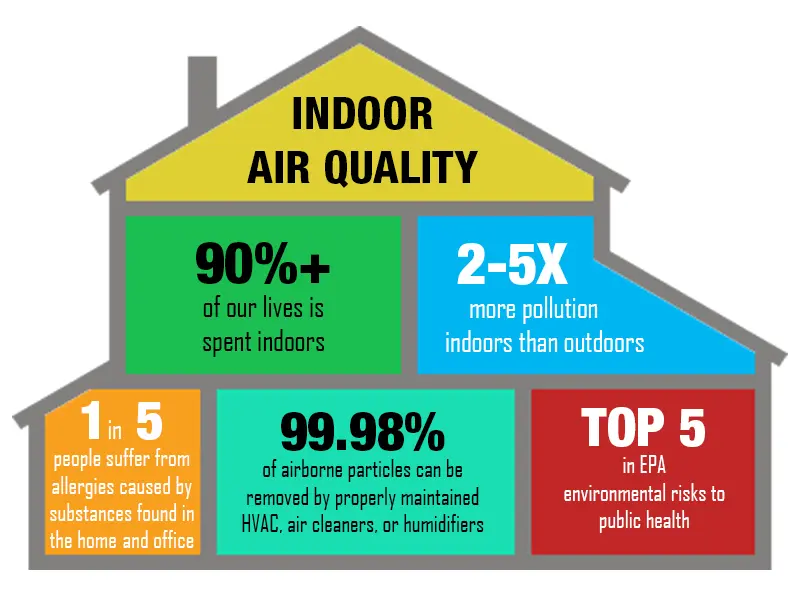How to Improve Indoor Air Quality in Your Home
- Jean Swafford
- Nov 23, 2024
- 4 min read
Introduction
Indoor air quality (IAQ) plays a critical role in your health and overall comfort. Poor air quality can exacerbate allergies, asthma, and other respiratory issues, while clean air can promote a healthier home environment. Fortunately, there are many ways to improve the air you breathe inside your home, from simple DIY solutions to professional HVAC upgrades. Here’s how you can enhance indoor air quality and create a cleaner, healthier living space.

1. Keep Your Home Clean
Regular cleaning reduces the accumulation of dust, pet dander, mold, and other allergens that can circulate through the air.
Vacuum Frequently: Use a vacuum with a HEPA filter to trap small particles, and vacuum carpets, rugs, and upholstered furniture regularly.
Dust and Mop: Dust surfaces with a damp cloth and mop floors to remove fine particles.
Wash Bedding: Wash bed linens, curtains, and other fabrics that collect dust in hot water weekly.
2. Change HVAC Air Filters Regularly
Your HVAC system’s air filters trap dust, pollen, pet dander, and other particles, preventing them from circulating in your home. Over time, these filters can become clogged and less effective, reducing air quality.
Frequency: Check and replace air filters every 1-3 months or as recommended by your manufacturer.
Upgrade Filters: Consider using high-efficiency filters, such as HEPA or pleated filters, for improved air filtration.
3. Invest in a Whole-Home Air Purifier
A whole-home air purifier can significantly improve air quality by removing allergens, bacteria, viruses, and other pollutants from the air.
How It Works: These systems work alongside your HVAC system to filter air as it circulates through your home.
Types: Options include UV air purifiers, activated carbon filters, and ionizers.
4. Control Humidity Levels
High humidity can create a breeding ground for mold, mildew, and dust mites, which can worsen allergies and asthma symptoms.
Ideal Humidity: Maintain indoor humidity levels between 30-50%.
Use a Dehumidifier: Consider using a dehumidifier to reduce moisture levels, especially in humid climates.
Ventilate Bathrooms and Kitchens: Use exhaust fans to remove moisture from the air after showers and cooking.
5. Improve Ventilation
Proper ventilation can help reduce indoor air pollutants by bringing in fresh outdoor air and reducing the concentration of contaminants.
Open Windows: When weather permits, open windows and doors to allow fresh air to circulate.
Use Exhaust Fans: Run exhaust fans in kitchens and bathrooms to expel moisture, smoke, and odors.
Energy Recovery Ventilators (ERVs): ERVs exchange stale indoor air with fresh outdoor air while maintaining energy efficiency.
6. Keep Ducts Clean
Dust, allergens, and mold can accumulate in your ductwork over time, affecting air quality and HVAC efficiency.
Schedule Regular Cleaning: Have your ducts inspected and cleaned by a professional if you suspect dust buildup or mold.
Check for Leaks: Ensure ducts are sealed properly to prevent contaminants from entering and circulating through your home.
7. Control Allergens with HEPA Filters
High-Efficiency Particulate Air (HEPA) filters are designed to trap 99.97% of particles as small as 0.3 microns, including dust, pollen, and pet dander.
Portable HEPA Air Purifiers: Use portable HEPA purifiers in high-traffic areas like bedrooms and living rooms.
Vacuum with a HEPA Filter: As mentioned earlier, using a vacuum with a HEPA filter further reduces allergens.
8. Minimize Indoor Pollutants
Reducing sources of indoor pollution can significantly improve air quality.
Avoid Smoking Indoors: Cigarette smoke contains harmful chemicals that can linger in the air and on surfaces.
Use Low-VOC Products: Choose paints, cleaning supplies, and building materials labeled as low in volatile organic compounds (VOCs).
Limit Use of Air Fresheners: Synthetic air fresheners can release harmful chemicals. Consider natural alternatives like essential oils.
9. Maintain Your HVAC System
Regular maintenance ensures that your HVAC system runs efficiently and effectively, contributing to better indoor air quality.
Schedule Annual Inspections: Have a professional HVAC technician inspect and maintain your system yearly.
Clean Coils and Components: Dirty coils and components can reduce airflow and contribute to poor air quality.
10. Test for Radon
Radon is a naturally occurring radioactive gas that can enter your home through cracks in the foundation. It’s odorless and invisible but can pose serious health risks.
Test Your Home: Use a radon testing kit or hire a professional to test for radon levels.
Mitigation Systems: If radon levels are high, a radon mitigation system can help reduce exposure.
11. Eliminate Mold and Mildew
Mold and mildew can contribute to poor indoor air quality and cause respiratory issues.
Fix Leaks Promptly: Address water leaks in roofs, walls, or pipes to prevent moisture buildup.
Clean with Mold-Resistant Products: Use mold-resistant paint and cleaning solutions in areas prone to moisture.
Remove Mold Safely: If mold is present, clean it with proper safety precautions, or call a professional for extensive infestations.
12. Add Indoor Plants
Certain indoor plants can help purify the air by absorbing toxins and releasing oxygen. However, be cautious as plants can also collect dust and contribute to indoor humidity.
Best Plants: Consider spider plants, peace lilies, and snake plants, which are known for their air-purifying properties.
Maintenance: Keep plant soil clean to prevent mold growth.
Final Thoughts
Improving indoor air quality is essential for a healthier, more comfortable living environment. By keeping your home clean, maintaining your HVAC system, and reducing indoor pollutants, you can breathe easier and enjoy a healthier home. If you’re looking for professional solutions to enhance your air quality, Big Air AC offers a range of services, including air purifiers, duct cleaning, and regular maintenance. Contact us today to learn more about creating a healthier home environment.


Comments